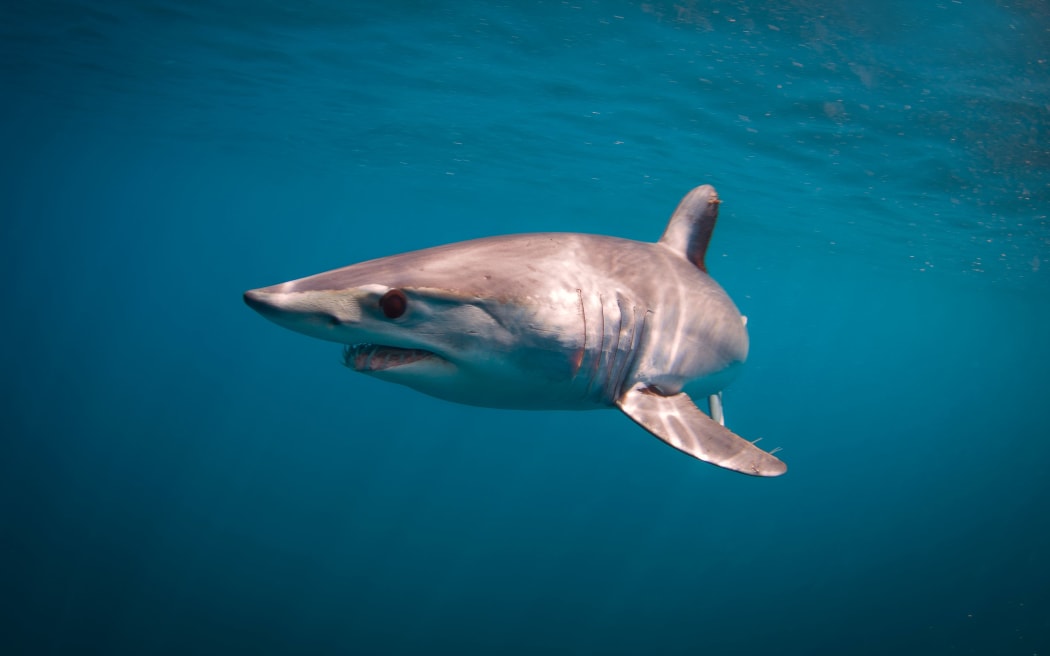A draft National Plan of Action on Sharks is promising, but needs to make the catching and killing of sharks by fishing crews illegal, according to Forest and Bird.

Photo: 123RF
The draft National Plan of Action Sharks 2022 (NPOA-Sharks 2022), which has just been released, sets out directions for the conservation, management, and sustainability of sharks caught in New Zealand waters.
It invites feedback on the best way to protect the various species in New Zealand waters.
Forest and Bird spokesman Geoff Keey is hoping the actual final plan of action will ban the wasteful and cruel killing of sharks.
The plan was prepared by the Ministry of Primary Industries (MPI), after consulting with the fishing industry, conservationists and scientists.
“I guess it’s three-quarters of where it needs to get to in the plan to save our sharks and give them the management they deserve. It needs a bit more work," Keey.
There are three big challenges the plan is trying to fix he said, the first being lot of unnecessary killing of sharks, which are then discarded after being landed on fishing boats.
The second challenge relates to fisheries quotas and whether these are even sustainable or not.
"There’s a lot of work that needs to be done to sort that out, so that the fish that we, the sharks we are catching we know that we’re catching them sustainably," Keey says.
There third issue relates pollution and problems with sedimentation in the coastal waters where there are shark nursery grounds. There is need to protect these vital habitats.
It is legal for fishing crews to kill sharks, which is why it’s happening, he says.
Three main species of big shark are affected by this industrial practice - porbeagles, makos and blue sharks. Porbeagles look like a shorter, smaller version of a great white, while makos are big, muscular, dramatic sharks with power jaws, commonly seen around New Zealand waters. Blue sharks are long and striking looking.
“All three are big oceanic sharks that travel long distances. Some of them come from here up to the equator and back," Keey says.
We should only be catching food in the sea and fishing crews shouldn’t be killing and throwing these big animals overboard simply because they want to retain the longline hook, he says.
“Rather than cut the sideline, the trace with the hook on it and let the shark go free, they’ll kill the shark by bludgeoning it to death in order to recover the hook or even just to cut the shark open to get the hook and then throw it back alive, but fatally wounded. There’s a lot of ethics around this, that we shouldn’t be doing this.”
Another reason to conserve these creatures is sharks are top predators and we’re reliant on them to maintain nature’s balance in the ocean. Studies have shown the coral reefs significantly lose coral when the big sharks go, as it creates a cascading effect on the eco-system.
Keey says five years' ago he would have been totally against MPI drafting conservation legislation, due to the conflict of interest between industrial profit and the need to conserve habitat and species. But things have changed since then, he says.
“This national plan of action is well-ahead of what we might have seen a few years ago and the fact that we’re seeing cameras coming out on boast across the inshore fleet will make a big difference. We’re seeing a far stronger kind of approach from MPI actually going what they’re supposed to in a way that wasn’t happening before.
“In the last five years there been a kind of overhaul in the ministry in terms of how it operates. The independence of the compliant arms so the can’t be influenced, all of that stuff suggests the agency has come a long way."
There remains a vital missing piece of regulation missing from the draft plan - make it illegal to kill and discard sharks, Keey says.
“The one thing that needs to happen is they need to move from encouraging fishers to no longer be catching and discarding sharks and actually make that a legal requirement. They need to change the rules, so that fishers can no longer to that and because they’d have the cameras on the boat they’d be able to enforce the law.”
The public needs to get behind conservation efforts and push for the change to the draft, he says.
“MPI has got a space on their website where people can download all the information and make submissions. We have stuff on our webite as well so there’s a bit more information that people can use. It’s really a case of, if you want to protect sharks you tell the government because that’s what will make a difference.”

